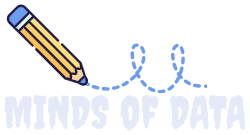Introduction:
Information plays a role in this age of advancements by driving innovative decision-making and progress across different sectors. Yet behind each decision based on data lies a network of relationships among individuals, organizations, and processes. This complex network, the data ecosystem, significantly impacts how we generate, manage, analyze, and utilize data. Join me in delving into the core of the data ecosystem, its functions, and the key players engaged in it.
What is a data ecosystem, and how is it used?
Picture a network of connections where information travels smoothly from where it originates to where it’s needed, going through changes and examinations on its journey. This network symbolizes the data environment, a system that covers all stages of data existence. The data environment manages how data moves from creation to gathering, storing, handling, analyzing, and using. It is used to generate insights and foster creativity.
The data ecosystem has a range of applications that mirror the variety of the data itself. For instance, imagine a large retail company analyzing customer buying patterns to forecast trends and enhance product control. In this case, the data ecosystem supports gathering data from sources, storage in a central database, processing using sophisticated analytics algorithms, and utilization in decision-making procedures.
Likewise, the healthcare data ecosystem helps incorporate health records, medical imaging data, and genetic information to tailor treatment plans and enhance outcomes. Whether it involves improving customer interactions, simplifying supply chains, or driving exploration forward, the data ecosystem stands as the foundation of innovation and advancement.
Key Players in the Data Ecosystem:
Organizations use data to uncover opportunities and apply that knowledge to differentiate themselves. For example:
- Identifying patterns in financial data to detect fraud.
- Use recommendation engines to drive conversion.
- Mining social media posts for customer’s voices.
- Analyzing customer behavior for personalizing offers.
We will learn who the key players are and how they use vast amounts of data to turn them into actionable insights:-
Data Engineers:
Data Engineers develop and maintain data architectures and make data available for business operations and analysis. It all starts with data engineers, and they work within the data ecosystem to:
- Extract, integrate, and organize data from disparate sources.
- Clean, transform, and prepare data.
- Design, store, and manage data in data repositories.
They enable data to be accessible in formats and systems that various business applications and stakeholders, like data analysts and scientists, can utilize.
SKILLS:
- Good knowledge of programming in Python, Java, and sometimes R.
- Sound knowledge of systems and technology architectures.
- In-depth understanding of relational and non-relational data stores.
Data Analyst:
Data Analysts transfer data and numbers into plain language so organizations can make decisions. They find answers to existing questions by creating insights from data sources. The responsibilities of a data analyst are:
- Inspect and clean data to derive insights and identify them.
- Identify correlations, find patterns, and apply statistical methods to analyze and mine data.
- Visualize data to interpret and present the findings of data analysis.
Data analysts are the people who answer questions such as:
- “Are the user’s search experiences generally good or based on our search functionality at our site?”
- What is the popular perception of people regarding our branching initiatives?”
- Is there a correlation between sales and one product and another?”
SKILLS:
- Good knowledge of spreadsheets, writing queries, and using statistical tools to create charts and dashboards.
- Some programming skills are Python and R.
- Solid analytical & storytelling skills.
Data Scientist:
A data scientist analyzes data for actionable insights and builds machine learning or deep learning models that train on past data to create predictive modules. They create new ways of modeling and understanding the unknown using raw data.
Data scientists create new questions using data. The responsibilities of a data scientist are:
Data scientists are people who answer questions such as,
- “How many new social media followers will I get next month?”
- “What percentage of my customers will I lose to competition in the next quarter?”
- “Is this financial transaction unusual for this customer?”
Skills:
- Knowledge of Mathematics and Statistics.
- Understanding of programming languages, databases, and building dase models,
- Domain Knowledge (specialized understanding of a particular activity, discipline, or industry acquired through formal or informal training and field experience. For example, an understanding of procedures for configuring technologies.)
Business and Business Intelligence Analysts:
- Business Analysts leverage the work of Data Analysts & Data Scientists to look at possible implications for their business and the actions they need to take or recommend.
- Analyzes data to help businesses improve processes, products, or services.
Business Intelligence [BI] Analyst also do the same except:
- Focus on market forces and external influences that shape their business.
- Provide business intelligent solutions by organizing & monitoring data on different business functions.
- Explore data to extract insights and actionable that improve business performance.
Several more key players use data ecosystems; they are:-
- A Data Analyst Consultant analyzes the system & models for using data.
- A Data Specialist uses expert technology and social science skills to find trends through data analysis.
- Operations Analyst analyzes data to assess the performance of business operations and workflows.
- Marketing Analyst analyzes market conditions to assess the potential scales of products and services.
- HR/Payroll Analyst analyzes payroll data for inefficiencies and errors.
- Financial Analyst analyzes financial status by collecting, monitoring, and reviewing data.
- Risk Analyst analyzes financial documents, economic conditions, and client data to help companies determine the level of risk involved in making a particular business decision.
- Healthcare Analysts analyze medical data to improve the business aspect of hospitals and medical facilities.
In this era of data-driven opportunities, learning the data landscape is crucial. By acknowledging the importance of stakeholders and working together, we can leverage data potential to encourage creativity, address issues, and pave the way for a better tomorrow for future generations. Join me on this adventure as we uncover the possibilities within the realm of data, one revelation at a time.

